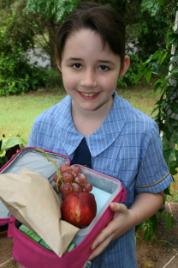Healthy school lunches are no longer child's play
Published on 12 February, 2009
Packing a healthy school lunch box isn't simple, according to Dr Karena Burke of CQUniversity's Institute for Health and Social Science Research...
Although Dr Burke believes most parents generally want to provide healthy, nutritious foods for their children, the problem is that parents face many mixed messages when it comes to choosing ‘healthy foods'.

Primary school student Annie Lawrence shows us what she thinks is needed in a healthy lunch box."At the moment, there is a major focus on food content from the perspective of calories, fat, carbohydrates, even additives, but parents and kids generally don't respond to that. They don't understand the science behind these terms, and so are just confused about all the messages they're getting.
"On the flip side, food just isn't simple anymore."
Dr Burke said it's not as easy as it used to be to rely on concepts like the healthy food pyramid to drive what we eat on a daily basis.
"I think for school lunches, the best advice for parents is to try to include foods that are processed as little as possible, sticking to fresh fruit and vegetables and avoiding artificial colourings, preservatives and flavour enhancers. If you're in doubt, cook it yourself if possible and educate yourself on what to avoid.
"We live in a consumer-driven market and people are looking for good food that is quick and easy to prepare - unfortunately a lot of that food is highly processed and therefore, even if it's billed as healthy, we don't necessarily get the same nutritional benefits as it we'd prepared it from scratch ourselves."
Some of the worst affected by our ‘easy meal' philosophies are people with food allergies or food intolerances.
A 2008 survey of 1200 people across Queensland indicated that around 23% of households had at least one person living there with a food intolerance. The most commonly cited intolerance was to food additives, closely followed by intolerances to lactose and gluten.

Senior researcher Karena Burke believes parents are faced with mixed messages about what is healthy and nutritious for their children.One of the biggest concerns for parents currently is food additives.
"While there is not an abundance of research in the field, studies that have been conducted show that children in general, not just those who are hyperactive and have ADHD, can be affected by food additives.
The awareness of these effects in our community is growing and people are having their say with some consumers avoiding products that contain artificial additives like colourings and preservatives.
The recent Nestle removal of artificial colourings from their Smarties range in Australia, following from the UK's lead a few years ago, is proof people are putting the pressure on food companies to ‘smarten' up their act when it comes to food content.
"I believe consumers are starting to have some say. Around 3 years ago we saw the beginnings of the removal of preservative 282 from a lot of bread products - this too was consumer voices having an effect."
Dr Burke has recently received a small grant to examine how parents and children adjust to life after discovering a food allergy or food intolerance.
She is also keen to shed some light on the current diagnostic procedures, particularly for food intolerances.

